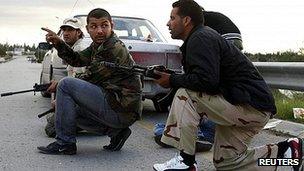Libyan factions in deadly clashes near Zawiya
- Published

Several days of fighting between rival factions near the Libyan coastal city of Zawiya have left at least seven people dead, reports say.
The BBC's Karen Allen in Libya says rival communities have been fighting for an area previously controlled by Gaddafi loyalists.
The interim government said the fighting had been resolved.
However analysts say the violence raises questions about stability in post-Gaddafi Libya.
The country is still awash with weapons and armed groups following the rebellion that led to the collapse of Col Muammar Gaddafi's rule.
Interim Libyan leader Mustafa Abdul-Jalil said the ruling ruling National Transitional Council (NTC) had brought together elders from the feuding areas - Zawiya and the nearby tribal lands of Warshefana - and that the dispute has been resolved over the weekend.
"I want to assure the Libyan people that everything is under control," he said on Sunday.
However, witnesses said some fighting was still taking place as he spoke.
Reports said trouble flared up on Thursday when fighters from Warshefana set up a checkpoint on a highway near Zawiya, challenging fighters from the city.
Fighters from Zawiya reportedly accused their Warshefana counterparts of having links to the old government.
A fighter from the capital Tripoli, quoted by AP news agency, said the two sides had been battling for control of a military camp of the ousted government on the main road between Tripoli and Zawiya.
Witnesses reported hearing heavy gunfire and the explosions of rocket-propelled grenades.
At least seven people were killed although one report quoting medics in the Warshefana region put the toll at 13 - four from Zawiya and nine from Warshefana.
Mr Abdul-Jalil said the trouble had been started by "young men behaving irresponsibly" and that the NTC had established a committee to address the grievances of both sides.
NTC leaders have said they cannot quickly disarm the various armed factions across the country.
Mr Abdul-Jalil said there was high unemployment among the armed men and that the new government had to offer alternatives such as jobs, education and training.